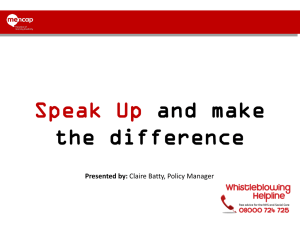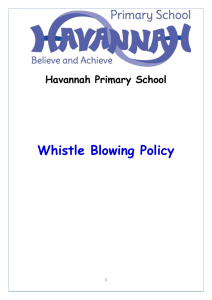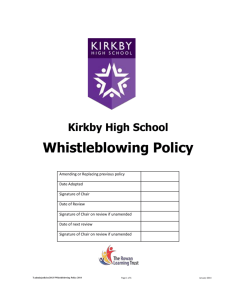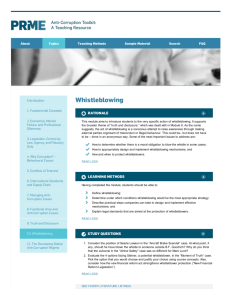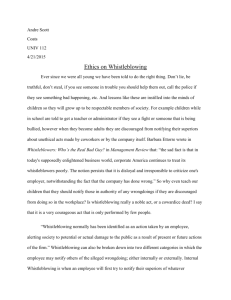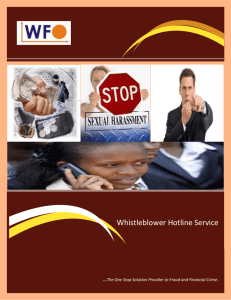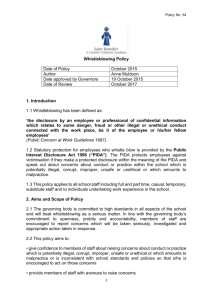guidance on whistleblowing
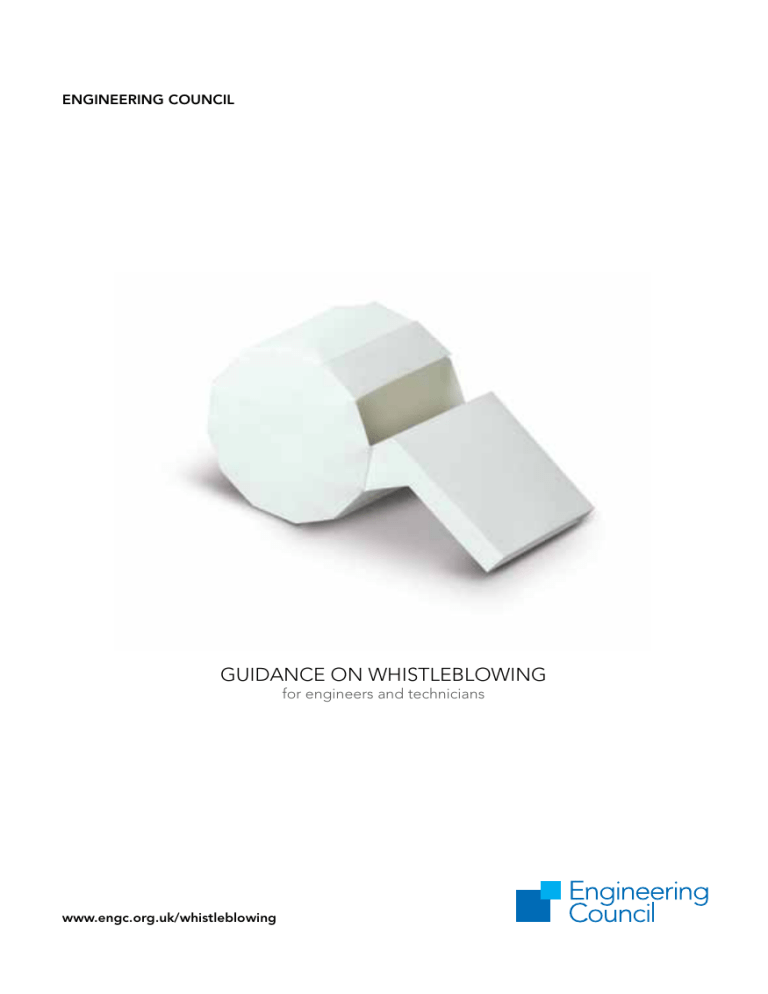
ENGINEERING COUNCIL
GUIDANCE ON WHISTLEBLOWING
for engineers and technicians www.engc.org.uk/whistleblowing
This guidance is intended to support engineers and technicians when confronted by a potential whistleblowing situation. It sets out the processes engineers and technicians should follow in raising such a concern and where to get advice.
What is whistleblowing?
What are my obligations if I have such a concern?
What does the relevant legislation say?
How do I raise a concern?
Where can I get advice?
The Engineering Council has published a policy statement on whistleblowing which is available at: www.engc.org.uk/whistleblowing
Whistleblowing is included in the Engineering Council’s Guidelines for
Institution Codes of Conduct.
The Engineering Council will review this guidance periodically and welcomes comments on it. Professional engineering institutions may wish to use it to assist them in developing guidance for their members.
Sources of further information are included at the end of this document.
What is whistleblowing?
‘Whistleblowing’ is defined by the UK Whistleblowing
Commission as ‘the raising of a concern, either within the workplace or externally, about a danger, risk, malpractice or wrongdoing which affects others’ .
For engineers, engineering technicians and ICT technicians, whose professional lives revolve around the management of risk,
‘risk’ is better interpreted to mean ‘inadequate quantification and management of risk’. A concern may include something which you may not be directly involved in, but become aware of in the course of your work.
What are my obligations if I have such a concern?
Your obligations when you have a concern can be categorised as ethical, professional and legal.
• You have an ethical responsibility as an engineer to act when you encounter a material and unmanaged risk, danger, malpractice or wrongdoing which adversely affects others.
• You have an obligation as a member of a professional engineering institution to act in line with your institution’s
Code of Conduct.
• You have a legal obligation to comply with the laws of the country in which you operate, and in all countries you will have an obligation to carry out your duties as an engineer or technician in a competent manner.
Your obligation to act when encountering something inconsistent with your Code of Conduct arises under that Code, but is not a legal requirement. However, you may become liable in law if you fail to take some action when it is part of your own professional duty. Your professional engineering institution’s
Code of Conduct may have changed since you joined, so it is important to ensure that you are up to date on your obligations.
This guidance does not cover the consequences of failing an ethical responsibility or a legal obligation, but if you fail in your professional obligations, you may be subject to your professional engineering institution’s disciplinary procedures and you could, if professionally registered, face removal from the
Engineering Council’s register.
Members of the Armed Forces and those involved in protecting
National Security who are not protected by the Public Interest
Disclosure Act 1998 (PIDA) will be excluded from following some aspects of this guidance, for example by working through the military chain of command and not externally. You should check with your employer.
What does the relevant legislation say?
The general principles of this guidance apply in whichever country engineers and technicians are working. However, the laws affecting whistleblowing vary widely from country to country.
Some countries may have little or no protective legislation in place, or it may favour the state or the employer more than UK or
US legislation does.
In considering how to act, the underlying law applicable to you or your employer may be that of the country where you are working, but if your contract of employment is made in England, it is subject to English law. Other combinations of circumstances may create more complexity, and often both English and local law may be relevant.
If you are considering whistleblowing outside the UK, you should ensure that you are aware of local legislation and local culture.
How do I raise a concern?
Technicians and engineers who cannot easily address a concern on their own should discuss it with, or report the concern to, their immediate employer or manager.
If this does not address the concern, you should ensure you are aware of, and make use of, existing company and industry sector regulatory reporting systems. Where there is no whistleblowing policy, you should still try to raise any concern internally. If this approach has not resolved the concern, or your immediate employer or manager is part of the cause, then you are obliged by your institution’s Code of Conduct to escalate your concern, which could mean raising it externally.
Provided a genuine concern is raised and you have a reasonable belief that you are acting in the public interest, UK law offers individuals protection from action taken by an employer for simply reporting a concern.
Your industry may be regulated. You should make use of any reporting systems which have been put in place by, for example the Health and Safety Executive (HSE); Civil Aviation Authority
(CAA); Maritime and Coastguard Agency (MCA); Office of Rail and Road (ORR) or other prescribed persons or bodies.
You should not try to use the protection which relevant legislation may offer whistleblowers simply to air or extend a personal disagreement or grievance with your employer.
Where can I get advice?
If the concern is a technical one which does not go beyond the application of engineering principles, your professional engineering institution may be able to offer guidance and advice. You should follow your professional engineering institution’s guidance and advice, and make use of any procedure it offers for raising, discussing and monitoring a technical issue.
If the concern is of a legal or HR nature then advice should be sought elsewhere. In addition to Public Concern at Work (the whistleblowing charity), industry regulators, trades union or employee legal assistance programmes may be able to provide additional help and advice.
If you are in a position of responsibility in an organisation without a clear ethical code of conduct and whistleblowing policy, you should take steps to ensure these are put in place.
In the UK, guidance is available from Code of Practice PAS
1998:2008 issued by the British Standards Institute (BSI) in conjunction with Public Concern at Work; the recommended code of practice in the UK Whistleblowing Commission Report; and the Department for Business, Innovation and Skills’
Whistleblowing Guidance for Employers.
Further information
Engineering Council www.engc.org.uk/whistleblowing
Public Concern at Work www.pcaw.org.uk
Publishes advice for individuals and employers.
Whistleblowing Commission Report
A Guide to the Public Interest Disclosure Act 1998
Department for Business, Innovation and Skills www.gov.uk/government/organisations/department-for-business-innovation-skills
Blowing the Whistle to a Prescribed Person – List of prescribed persons and bodies
Whistleblowing Guidance for Employers and Code of Practice
Health and Safety Executive www.hse.gov.uk
Whistleblowing and Whistleblowers – Operational Guidance
British Standards Institute shop.bsigroup.com/forms/pass/pas-1998
Code of Practice PAS 1998:2008 issued by the British Standards Institute (BSI) in conjunction with Public Concern at Work
CIPD www.cipd.co.uk
Whistleblowing Factsheet
Civil Aviation Authority www.caa.co.uk
CAA Whistleblowing Policy
Maritime and Coastguard Agency www.gov.uk/government/organisations/maritime-and-coastguard-agency
Office of Rail and Road www.orr.gov.uk
Other guidance we publish
ENGINEERING COUNCIL ENGINEERING COUNCIL ENGINEERING COUNCIL
ROYAL ACADEMY OF ENGINEERING www.engc.org.uk/risk
Risk
Guidance on Risk for the Engineering Profession www.engc.org.uk/sustainability
Sustainability
STATEMENT OF ETHICAL PRINCIPLES for the Engineering Profession www.engc.org.uk/professional-ethics
Ethics
T +44 (0)20 3206 0500 info@engc.org.uk www.engc.org.uk
@EngCouncil
Publication of extracts from this document are encouraged, subject to attribution to the Engineering Council
Registered Charity: 286142
Published August 2015
Please refer to the Engineering Council website to ensure that you have the current version.
